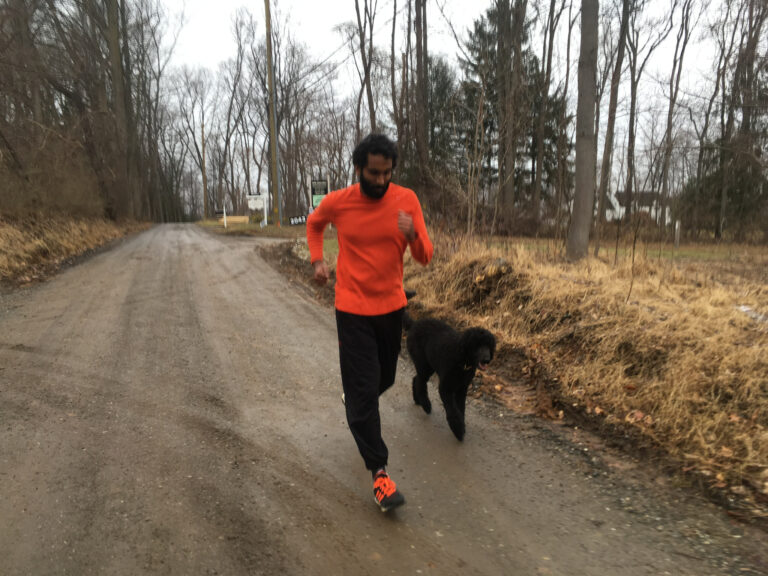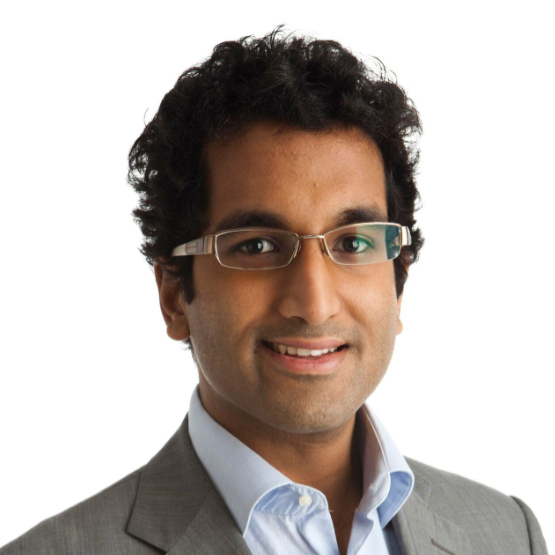The London marathon was an incredible experience that I will never forget. It was a wonderful combination of realising my suppressed potential, of appreciating the spirit of London and having the opportunity to raise some money to support the irreplaceable work of the NSPCC.
The first thing that people said to me when I told them that I was running the marathon was usually something along the lines of, “I could never do that” and I can see why people might worry. The run which inspired the modern-day marathon, way back in 490 BC, when Pheidippides ran from the city of Marathon to Athens, was immediately followed by Pheidippides collapsing and dying. However, in training I quickly realised that the potential of my body was far greater that I ever realised, and that conditioning no matter what your start point could deliver results.
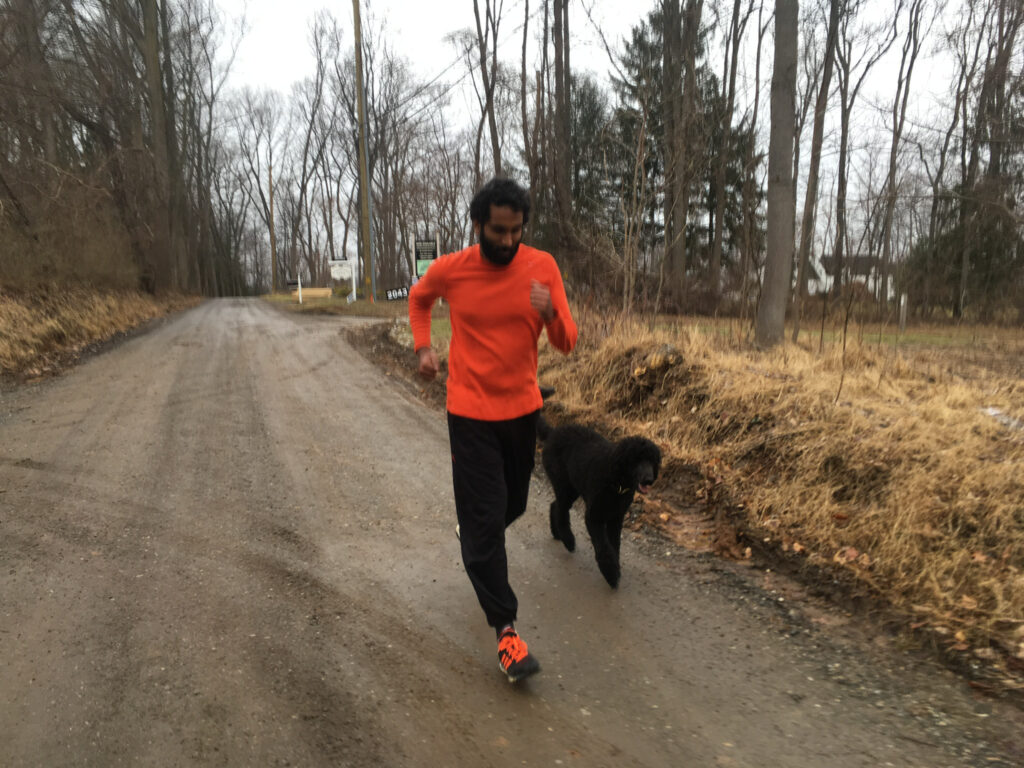
You may not do a marathon, but you can find your equivalent.
What was my starting point? I grew up in a world where physical fitness felt redundant. Quite the opposite in fact: my dad having come from a poor background in Pakistan, associated his belly with success. Physical fitness was never required for getting around when my parents always drove me from place to place. There was also a time cost with exercise; it was time away from studying which was always drummed into me as the most important thing to commit my time to.
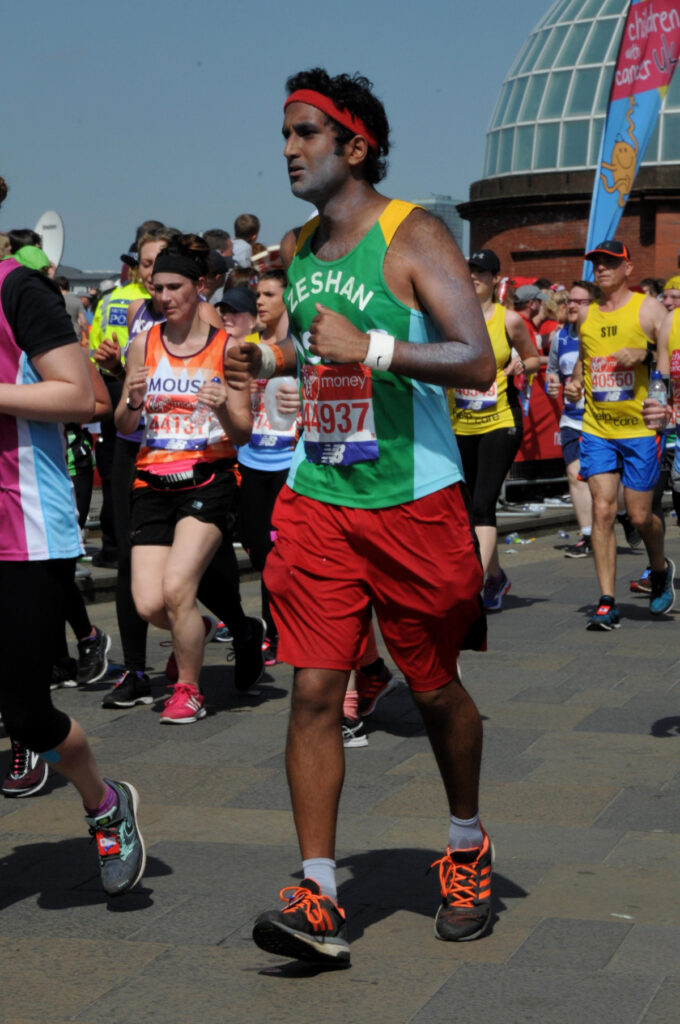
And so what was the consequence of this? Sport was never a major part of my life. I consistently got Grade C and Ds in PE, and no one seemed to care, not teachers, not family. I developed asthma, to the point of having to attend hospital several times, but I didn’t really care too much about getting the management right because I was never going to push myself physically that much. So what changed? As I’ve got older, I’ve become a lot more reflective as a person, and I’m trying to be the best versions of myself. This involved critically assessing every aspect of who I am. As a doctor, I’m constantly telling children and families about the importance of being healthy, and of looking after themselves. I suddenly came to the seemingly obvious realisation that it didn’t make sense to advice something, but not follow it myself.
I thought why not sign up to the toughest challenge I could think of
I started playing tennis, doing some cardiovascular workouts, and going running. It seems silly in retrospect, but then I thought why not sign up to the toughest challenge I could think of, link it a need for more long term fitness, and to fundraising for a wonderful cause in the NSPCC: a service which I saw an acute need for in my day to day practice. I signed up to the London marathon, and my training began. I got given a regime by the NSPCC, and it seemed like it would be a simple case of doing what I was told. Three to five days of exercise a week and stretches/strengthening exercise each day. However, I immediately ran into problems: my asthma got worse. I got severe knee pain. Very quickly I had to stop what I was doing and was told to rest by an advisor. I was really saddened because at the very first hurdle, I seemed to be failing. But I wanted to believe this was possible. Fortunately, on a plane, I was sat next to a physiotherapist. We had a really lovely chat and he made me realised that I needed to strengthen the muscles in my legs and improve my flexibility. I went to a running shop where my running pattern was assessed. I got really great advice not only on footwear but also on improving my food and water intake. And finally I got my asthma treatment optimised.
Running itself also gave me a wonderful insight into the world around me.
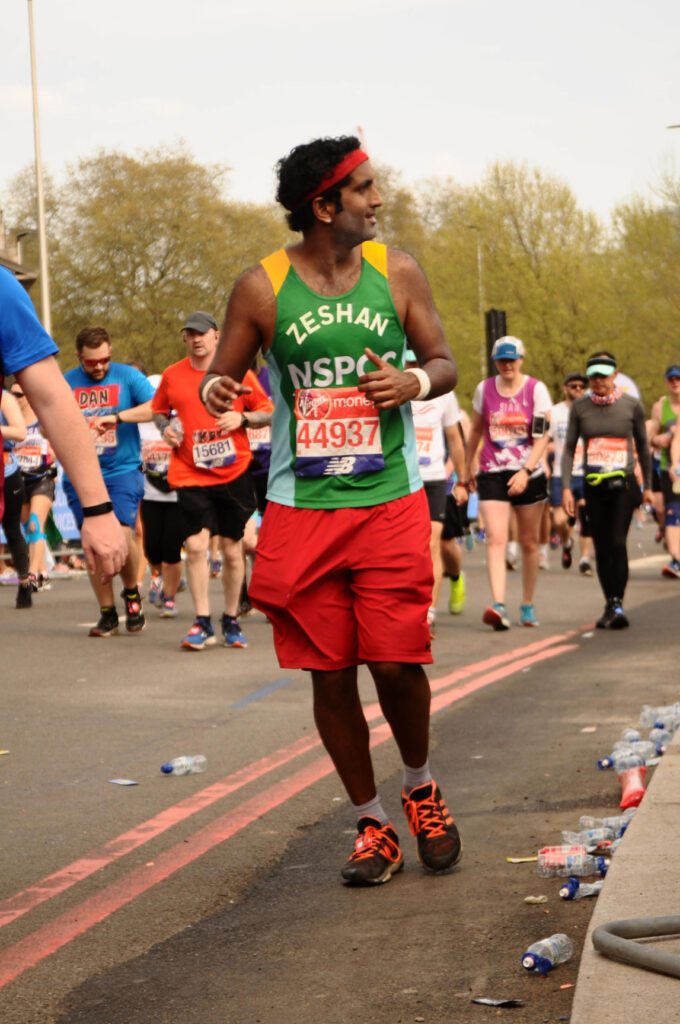
The experiences I then had running were incredible. As my regime continued, every week I was running further than I’d ever done in my life. It wasn’t just that which was a sense of achievement. I also developed insight into what makes a good athlete. I used to think this was all about raw power and simply putting in the time: the stronger your body the better the athlete, regardless of any thought or strategy. However, the more I exercised, the more I realised that the mental battle was immeasurably more important. My body was constantly telling me stop, and the challenge was identifying when to listen: was this an injury, or was this expected exercise-related aches and pain? As I matured, and I understood myself better, I realised that pain and apparent breathlessness were not a barrier to pushing myself harder, and I could exercise in a zone of much greater intensity which although was a psychological challenge, meant I could go faster and further.
Running itself also gave me a wonderful insight into the world around me. I’m so lucky that I get to travel so much. In the five weeks or so leading up to the marathon, I found myself in 20 different places in the world, from temperate rainforests in Canada, to endless beaches in California, to the forests in Austria and Lithuania. Seeing the world on foot was intimate and special: all my senses felt engaged, and stripped of technology I felt part of nature rather than an observer. I appreciated cities and varied landscapes around the world but also the beauty that could be found in my hometown of London.
And then it came to race day. Excitement and nervousness are very similar things in many ways and I experienced both simultaneously. But there was also a rational element of me that believed in my training. That told me that I could do this because 40,000 other people were going to do it, even though I’d never done it before.
One person saw me struggling, put his arm round me and said ‘Zeshan, I know you’re in pain, its ok, you can do this, I know you can, keep going’
However, as soon as I got to the start point of the marathon, my nerves started easing. I was greeted by the warm NSPCC team that had been supporting me the whole time, with a big smile and lots of extra suncream. The other runners shared their stories, and treated me like their best friends. We were put in lots depending on our predicted start times, which meant I was right at the back as I chose to be conservative given I’d never run competitively before.
Start time, and I set off. I was excited but remembered not to let the excitement overcome me. I deliberately went off slower than I wanted to, knowing it would be good to conserve energy. Within minutes, I heard people shouting out my name, and then I suddenly remembered it was written across my shirt. It was a part of London that is invisible most of the year: a genuine desire to help and motivate others. It wasn’t just cheers, it was also sugary treats and motivational banners. Beyond that, there was constant and diverse entertainment all the way along. From professional drumming groups, to full blown orchestras, to stages with live bands to people DJing from their windows!
The lady that most impressed me did the whole thing on stilts.
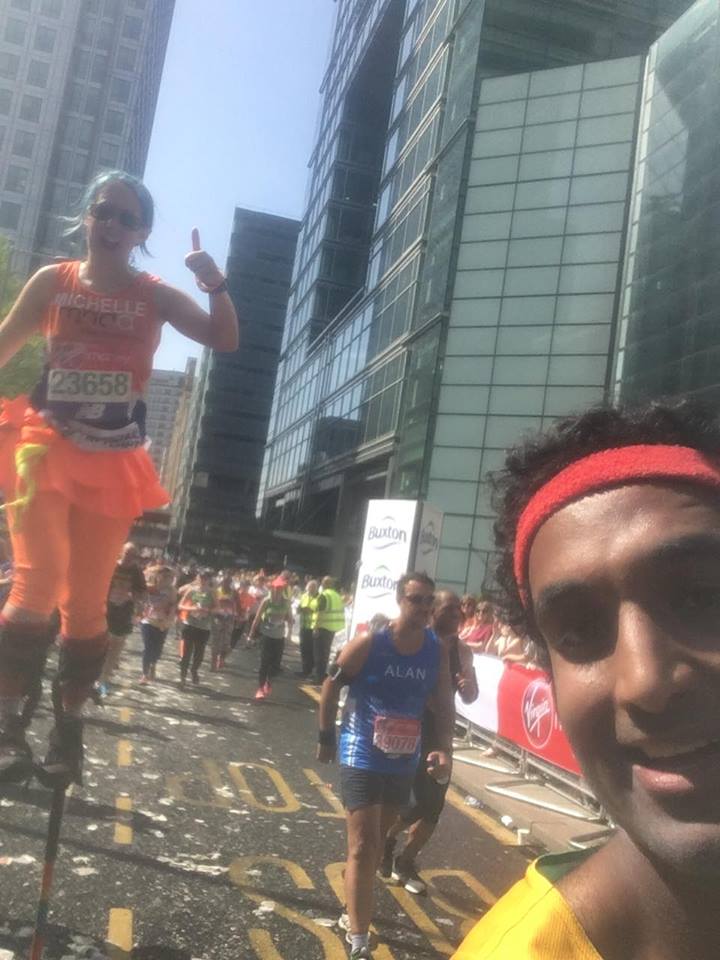
The runners themselves provided their own inspiration. There were those that were doing the absurd, dressing as rhinos, as wombles, as Snow White, carrying bikes, or even, between a few people, the framework of a car. The lady that most impressed me did the whole thing on stilts. In terms of running itself there was so much motivation given to me by fellow runners. I got patted on the back so many times I lost count. One person saw me struggling, put his arm round me and said ‘Zeshan, I know you’re in pain, its ok, you can do this, I know you can, keep going’.
I had everything in place in terms of my regime. I knew what pace I wanted to go at, and felt I could go at. I had a food regime, I had a water/Lucozade regime, which mean I consumed about 5 litres of fluid throughout the race (without having to pee!). But what I hadn’t quite realised was what would be required for the psychological regime. I got to around mile 20, I’d been running for hours, and a tear left my eye. I was now running further than I’d ever done in my life, and I just didn’t know if I could do it. I said to myself “I cant do this, this is too hard”.. But then I looked around, and remembered all those people cheering, all those peope who had supported me, all those people that had raised over £2500 for the NSPCC.
There I was finally really understanding the psychological barriers in running, and to some extent at least, overcoming it. I saw the finish line and then sprinting through in elation, beating my own predicted time by 45 minutes!
I thought back to my training. I really tried to listen to my body, and think objectively. I was loaded with calories, I was well hydrated, I felt hot, but not dizzy or faint, my legs hurt, but the pain it wasn’t focused to a particular location and it wasn’t severe, my breathing was OK. Everything objectively seemed fine, and everyone was still routing for me. So I took a deep breath, and I powered through, going from almost giving up, to going faster than I’d done for the entire of the race. There I was finally really understanding the psychological barriers in running, and to some extent at least, overcoming it. I saw the finish line and then sprinting through in elation, beating my own predicted time by 45 minutes! My legs had turned to jelly, and everyone around me was asking me if I was OK. I was exhausted but elated and in good health. I couldn’t sign my name properly, and I’d lost my balance, but I’d made it. It was such a wonderful feeling, and like no other.
The NSPCC treated us so well, and the end was no exception. They fed us and massaged our aching legs, whilst at every point thanking us for going through it all. My friends and family had been amazing, even people I hadn’t seen for 15 years suddenly got in touch, with kind messages of support, helping me get through.
I feel so lucky having had this opportunity, and I’m so glad I had the courage to try something seemingly impossible. Exercise is not just for the elite. It is something that everyone can do, if they commit the time, and the mental energy to it. You may not do a marathon, but you can find your equivalent. Thank you for everyone for your support: it meant so much, and I’m looking forward to my next challenge!

